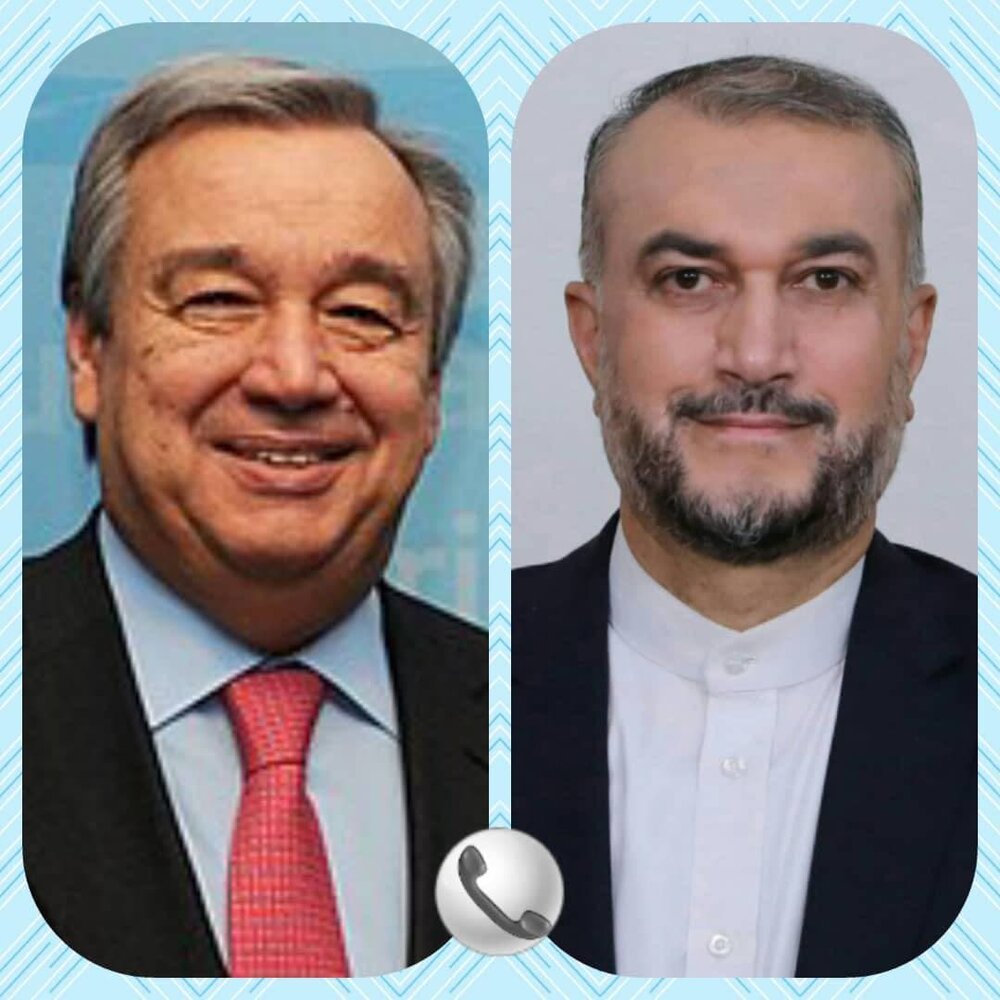Iran FM, UN chief hold phone talks

TEHRAN – Iranian Foreign Minister Hossein Amir Abdollahian on Thursday exchanged views with United Nations Secretary-General Antonio Guterres on the developments in the West Asia region, including the latest situation in Yemen and Afghanistan, as well as the process of the Vienna talks.
In the talks, Iran's foreign minister pointed to the situation in Yemen and an escalation of attacks on civilian areas and reiterated Iran’s ongoing approach on supporting a political solution to the Yemen war, the Iranian Foreign Ministry said.
Referring to the UN’s approach on terminating the blockade as well as bringing about a ceasefire and holding political talks in Yemen, Amir Abdollahian called on the secretary-general to play a more active role in efforts to lift the siege on Yemen and put an end to the large-scale bombardment of civilian regions.
Amir Abdollahian on Thursday lamented the recent increase in military attacks against Yemen in a meeting with his Qatari counterpart Mohammed bin Abdulrahman Al Thani, saying such moves will “destroy the path to peace.”
“In recent weeks, we have witnessed an increase in military moves regarding Yemen, and such moves will lead to outbreak of further wars in Yemen and the region, and destroy the path to peace,” Press TV quoted the Iranian foreign minister as saying.
Earlier on Tuesday, Ali Asghar Khaji, a senior advisor to the Iranian foreign minister for special political affairs, met with Peter Semneby, Sweden’s special envoy for Yemen. The two diplomats discussed latest developments in Yemen via a video conference.
During the video discussion, the two sides exchanged views over potential areas of cooperation between Iran and Sweden for the purpose of helping resolve the Yemeni crisis and end the ongoing humanitarian catastrophe in the country.
The conversation came against a backdrop of heightened tensions between Yemen and the United Arab Emirates (UAE). The Sanaa-based government has launched two drone and missile attacks on the UAE in recent days.
Iran has expressed concern over the situation in Yemen. On January 24, Amir Abdollahian said the Islamic Republic has already tabled its four-point political plan to end the conflict.
In April 2015, Iran presented a four-point plan to the UN in a bid to end the conflict in Yemen. The four-point called for the cessation of hostilities and an immediate end to all foreign military attacks, direct delivery of medical and humanitarian aid, the resumption of political talks and the creation of a broad Yemeni unity government.
800,000 newly-displaced Afghans have entered Iran
During his conversation with the UN chief, Iran’s foreign minister also stressed the necessity of paying special attention to the humanitarian crisis in Afghanistan and the situation of the displaced people. “Over the past months, the Islamic Republic of Iran has hosted about 800,000 newly-displaced people, something that demands serious international cooperation and efforts.”
Amir Abdollahian once again stressed the need for the formation of an inclusive government in Afghanistan and voiced the Islamic Republic’s preparedness to facilitate the dispatch of humanitarian aid by other countries and international bodies via Iran.
The foreign minister also pointed to the talks in Vienna aimed at removing sanctions on Iran, describing the process as positive and reiterating the Islamic Republic’s serious determination to reach a good agreement in the shortest time possible.
Amir Abdollahian reaffirmed lack of trust in the White House’s rulers and emphasized the need for America and the Western side to adopt practical, tangible and verifiable measures in order to prove the possibility of achieving a lasting, reliable deal.
During the talks, Guterres, for his part, welcomed and praised Iran’s constructive positions in efforts to achieve peace and end military attacks as well as its attention to humanitarian issues and the start of political negotiations to resolve Yemen’s problems.
The UN secretary-general also stressed the necessity of continued efforts to establish an inclusive government comprised of various groups and ethnicities in Afghanistan and preparing the ground for all Afghan citizens, particularly women and children, to enjoy human rights and have access to education.
Guterres, in the end, welcomed any progress in the process of nuclear negotiations on the removal of sanctions in Vienna and said the United Nations has constantly supported the achievement of the nuclear deal and international peace with all its resources and capabilities.
